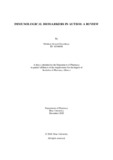Immunological biomarkers in autism: a review

View/
Date
2020-12Publisher
Brac UniversityAuthor
Chowdhury, Mishkat AhmedMetadata
Show full item recordAbstract
Autism spectrum disorder (ASD) is a specific heterogenous neurodevelopmental disorder focused on the occurrence and intensity of core anomalies in social contact and repetitive behaviour, with complex pathogenesis and diagnosis. However, investigations have linked immune dysregulation as a hallmark of ASD. The prime justification for this claim lies in the numerous studies in the last four decades which found a frequent impaired immune response in individual with ASD. The aim of this review is to identify some immunological biomarker to investigate immune dysfunction in the diagnosis and treatment of ASD. Many studies have documented several immune cell abnormalities in ASD subjects, namely T-cells, B-cells, natural killer cells, and monocytes. Additionally, impairment in immunoglobulin regulation, chemokine activities and elevated autoantibodies production have been reported in many analyses. On top of that elevated peripheral cytokines, and chemokines and related neuroinflammation have been observed in a substantial chunk of individual diagnosed with ASD.
